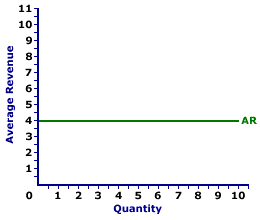
|
|
ZERO-SUM GAME: A situation in which a fixed amount is divided up among the winners and losers. In a zero-sum game the wins equal the losses. Many stock market, or financial market, exchanges are zero-sum. One person buys low and sells high, while another buys high and sells low. The wealth in such transactions are merely transferred from one person to another. "Productive" market transactions, in contrast, are not zero-sum. The act of producing goods and services from resources that are consumed to satisfy wants and needs results in a net gain to society.
Visit the GLOSS*arama
|
|


|

|
                           AVERAGE REVENUE CURVE, PERFECT COMPETITION: A curve that graphically represents the relation between average revenue received by a perfectly competitive firm for selling its output and the quantity of output sold. Because average revenue is essentially the price of a good, the average revenue curve is also the demand curve for a perfectly competitive firm's output. Perfect competition is a market structure with a large number of small firms, each selling identical goods. Perfectly competitive firms have perfect knowledge and perfect mobility into and out of the market. These conditions mean perfectly competitive firms are price takers, they have no market control and receive the going market price for all output sold.The average revenue curve reflects the degree of market control held by a firm. For a perfectly competitive firm with no market control, the average revenue curve is a horizontal line. For firms with market control, especially monopoly, the average revenue curve is negatively-sloped. Average Revenue Curve,
Zucchini Style |  |
Average revenue is commonly represented by an average revenue curve, such as the one displayed in the exhibit to the right. This particular average revenue curve is that for zucchini sales by Phil the zucchini grower, a presumed perfectly competitive firm. The vertical axis measures average revenue and the horizontal axis measures the quantity of output (pounds of zucchinis). Although quantity on this particular graph stops at 10 pounds of zucchinis, the nature of perfect competition indicates it could easily go higher. This curve indicates that if Phil sells 1 pound of zucchinis, then his revenue per unit is $4. However, if he sells 10 pounds, then he also receives $4 of average revenue. Should he sell 100 pounds, then he moves well beyond the graph, but his average revenue remains at $4. The average revenue curve is actually the demand curve for Phil's zucchinis. In fact, in the same way that average revenue is just another term for price, the average revenue curve is just another term for demand curve.

Recommended Citation:AVERAGE REVENUE CURVE, PERFECT COMPETITION, AmosWEB Encyclonomic WEB*pedia, http://www.AmosWEB.com, AmosWEB LLC, 2000-2025. [Accessed: July 2, 2025].
Check Out These Related Terms... | | | | | | | | |
Or For A Little Background... | | | | | | | | | | | |
And For Further Study... | | | | | | | | |
Related Websites (Will Open in New Window)... | | | |
Search Again?
Back to the WEB*pedia
|



|

|
|
The wealthy industrialist, Andrew Carnegie, was once removed from a London tram because he lacked the money needed for the fare.
|

|
|
"always remember an epitaph which is in the cemetery at Tombstone, Arizona. It says: „Here lies Jack Williams. He done his damnedest.¾ I think that is the greatest epitaph a man can have ‚ When he gives everything that is in him to do the job he has before him. That is all you can ask of him and that is what I have tried to do. " -- Harry Truman, 33rd US president
|

|
SFA
Securities and Futures Authority (UK)
|

|
|
Tell us what you think about AmosWEB. Like what you see? Have suggestions for improvements? Let us know. Click the User Feedback link.
User Feedback
|


|


